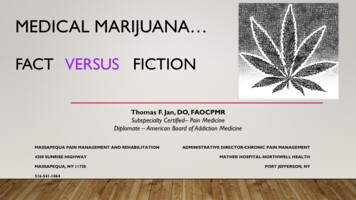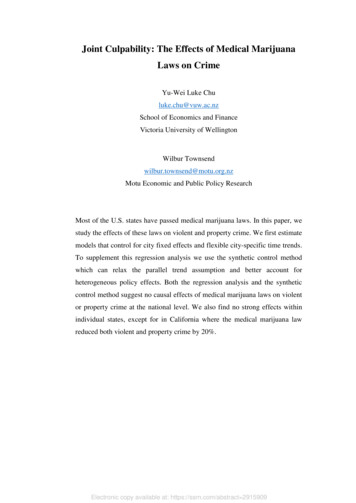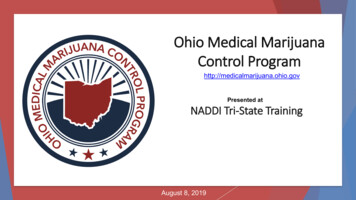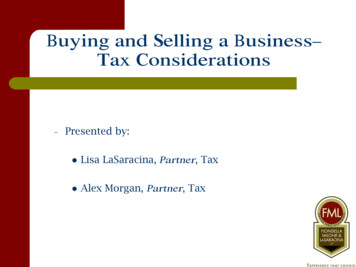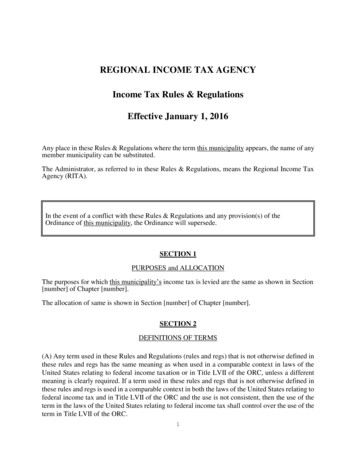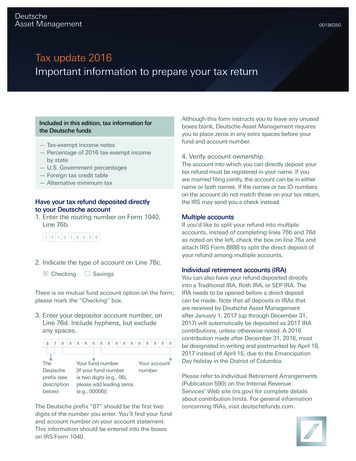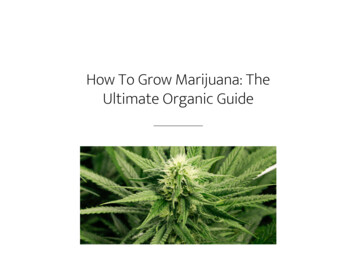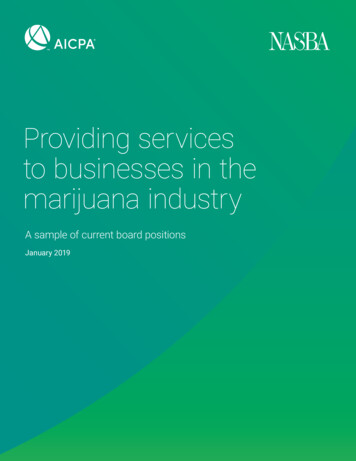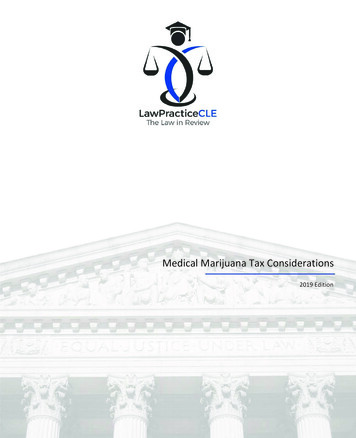
Transcription
Medical Marijuana Tax Considerations2019 Edition
andlegalprofessionalsfrom crossthecountry.Wealsoofferahostofwaysforourteam tclips,emails,andmuchmore!1. ACourseDescription2. 34LearningObjectivesorKeyTopics3. ADetailedAgenda4. Ranch,Florida34202
LawPracticeCLEThe Law in ReviewLAWPRACTICECLE UNLIMITEDLawPracticeCLE Unlimited is an elite program allowing Attorneys and Legal Professionals unlimited access to allLawPracticeCLE live and on-demand courses for an entire year.LawPracticeCLE provides 20 new continuing legal education courses each month that will not only appeal to your liking,but also meet your State Bar Requirements.Top Attorneys and Judges from all over the country partner with us to provide a wide variety of course topics from basicto advanced. Whether you are a paralegal or an experienced attorney, you can expect to grow from the wealth ofknowledge our speakers provide.COURSE CATEGORIESA View From The BenchAnimal LawBankruptcy LawBusiness LawCannabis LawConstruction LawCriminal LawCybersecurity LawEducation LawEmployment LawEntertainment LawEstate PlanningEthics, Bias, and ProfessionalismFamily LawFederal LawFood and Beverage LawGun LawHealth LawImmigration LawIntellectual Property LawInsurance LawNonp rofit LawParalegal StudiesPersonal Injury LawPractice Management & Trial PrepReal Estate LawReligious LawSocial Security LawSpecialized TopicsTax LawTechnology LawTransportation LawTribal LawACCREDITATIONMore Coming Soon.LawPracticeCLE will seek approval of any CLE program where the registering attorney is primarily licensed and a singlealternate state. The application is submitted at the time an attorney registers for a course, therefore approval may not bereceived at the time of broadcasting. In the event a course is denied credit, a full refund or credit for anotherLawPracticeCLE course will be provided.LawPracticeCLE does not seek approval in Illinois or Virginia, however the necessary documentation to seek CLE creditin such states will be provided to the registrant upon request.ADVERTISING WITH LAWPRACTICECLEAt LawPracticeCLE, we not only believe in quality education, but providing as many tools as possible to increasesuccess. LawPracticeCLE has several advertising options to meet your needs. For advertising and co-sponsorshipinformation, please contact the Director of Operations, Jennifer L. Hamm, JLH@lawpracticecle.com.CHECK US OUT ON SOCIAL MEDIA Facebook: https://www.faceboo k.com/LawPracticeCLEfinLinkedln: https://www.linkedin.com/company/lawpracticecle@ lnstagram: https://www.instagram.com/lawpracticecle0Twitter: https://twitter.com/LawPracticeCLE
TAX CONSIDERATIONSFOR MEDICAL MARIJUANAPRESENTED BY: DIONNE M. KELLIER, ESQ
WHY ARE YOU HERE? LEGAL MARIJUANA SALES ARE EXPECTED TO EXCEED 24.5 BILLIONDOLLARS BY 2021, AND THIS COURSE WILL PROVIDE A CONCISE LOOKAT A WIDE RANGE OF LEGAL ISSUES, FOCUSING ON TAXIMPLICATIONS, FOR THOSE INVOLVED IN THE MEDICAL MARIJUANAINDUSTRY. AT LEAST 33 STATES HAVE LEGALIZED THE USE OFMEDICAL MARIJUANA, AND 10 STATES, INCLUDING WASHINGTON, D.C.HAVE LEGALIZED RECREATIONAL ADULT USE. ATTORNEYSATTENDING THIS CLE WILL BE ABLE TO NAVIGATE THIS THRIVINGINDUSTRY WITH THE KNOWLEDGE AND SKILLS NECESSARY TOPROVIDE GUIDANCE TO CANNABIS PRODUCERS, PROCESSORS,WHOLESALERS, RETAILERS AND AUXILLARY BUSINESSES.
DIONNE M. KELLIER, ESQ Dionne Kellier is Counsel to Hoban Law Group and an Attorney-at-Law licensed to practice inthe State of Florida and Washington, D.C. Dionne received her B.A. in Legal Communicationsfrom Howard University in Washington, D.C. and her Juris Doctor from Nova SoutheasternUniversity in Fort Lauderdale, FL. Dionne received her LLM in Taxation from VillanovaUniversity in Pennsylvania. Prior to getting involved in Tax Law, Dionne was a litigator for several years, representingLenders, Banks and Servicers in Foreclosure actions. In 2015, she moved to Colorado andbecame very interested in the Cannabis Industry, and made it her mission to provide properplanning and advice to those in the Industry, especially regarding Banking and Taxation. Recently, Dionne moved back to Florida but has maintained her mission of seeking to help thosein the Industry plan properly. She is in private practice in Downtown Fort Lauderdale at DionneM. Kellier, PA and her practice consists of Tax Resolution, Tax Planning and Business Planning.
HOBAN LAW GROUP Formed in 2008 in ColoradoPracticing exclusively in Cannabis since 201136 Licensed Attorneys in over 40 StatesSpecializing in Cannabis Business matters: Tax IP Litigation M& A and General Corporate Counsel Regulatory and Compliance Advice, among others.
CURRENT FEDERAL POSITION ONMEDICAL MARIJUANA Schedule I: Drugs, substances or chemicals with no currently accepted medical useand a high potential for abuse. https://www.dea.gov/druginfo/ds.shtml Why is this important? Tenth Amendment and Commerce Clause Unless and until Congress, either declassifies Medical Marijuana as a Schedule I Drug orprovides an exception to IRS Code 280-E regarding Medical Marijuana, any business orperson involved in the Industry is technically violating Federal Law Thirty (30) States and the District of Columbia in which Medical Marijuana is legal (seechart)
STATES WITH LEGAL MEDICALMARIJUANA
WHAT IS HEMP? Hemp is the fiber and seed part of the Cannabis Sativa L. plant, opposed to theflower part of the plant which is “legally considered” marijuana. The fiber andseeds are incredible valuable and is why hemp is often called a “cash crop”. Hempis a very hearty plant and grows very quickly in very diverse soilconditions. Cultivation of hemp for industrial purposes has been done by manycivilizations for over 12,000 years. Industrial hemp was the desired fiber used tomanufacture rope, canvas, paper, and clothing until alternative textiles and syntheticsfor these purposes were discovered. Although China has been the largest hempproducer over the years, other countries such as Australia and Canada are catchingup Historical Facts
CURRENT FEDERAL POSITION Cole Memorandum, August 29, 2013 29132756857467.pdf Served as guidance to Department of Justice attorneys and law enforcement to focus their enforcement resources and efforts, including prosecution, on personsor organizations whose conduct interferes with any one or more of [these priorities], regardless of state law. Enforcement Priorities: Preventing the distribution of marijuana to minors Preventing revenue from the sale of marijuana from going to criminal enterprises, gangs, and cartels Preventing the diversion of marijuana from states where it is legal under state law in some form to other states Preventing state-authorized marijuana activities from being used as a cover or pretext for the trafficking of other illegal drugs or other illegal activity Preventing violence and the use of firearms in the cultivation and distribution of marijuana Preventing drugged driving and the exacerbation of other adverse public health consequences associated with marijuana use Preventing the growing of marijuana on public lands and the attendant public safety and environmental dangers posed by marijuana production onpublic lands Preventing marijuana possession or use on federal propertyOutside of these enforcement priorities, the federal government has traditionally relied on state and local law enforcement agencies to address marijuana activitythrough enforcement of their own narcotic laws
COLE MEMORANDUMAUGUST 29, 2013
CURRENT FEDERAL POSITIONCONTINIUED ROHRABACHER-BLUMENAUER AMENDMENT In place since 2014 (Rohrabacher-Farr) Annual appropriations bill which only protects medical cannabis Maintains that Federal funds cannot be used to prevent states from “implementing their ownstate laws that authorize the use, distribution, possession or cultivation of medicalmarijuana” Though the amendment had been passed in subsequent appropriations bills, it expired onDecember 21, 2018 – the beginning of the current government shutdown. With Mr.Rohrabacher no longer in Congress, Representative David Joyce will be a key Republicanvoice in this policy area, and his role on Appropriations will be especially important toefforts to reform cannabis law.
ROHRABACHER-BLUMENAURAMENDMENT8/14/2018H.Amdt.332 to H.R.2578 - 114th Congress (2015-2016) Congress.gov Library of CongressH.Amdt.332 to H.R.2578114th Congress (2015 2016)DescriptionText (1)Actions (2)Description: H.Amdt. 332 — 114th Congress (2015 2016)All Information (Except Text)Amendment prohibits the use of funds in the bill to supersede State law in those States that have legalized the use of medical marijuana.Purpose:An amendment to prohibit the use of funds by various states to prevent any of them from implementing their own laws that authorize theuse, distribution, possessions, or cultivation of medical marijuana.House Amendment Code:(A064)House Tally Clerks use this code to manage amendment information.
CURRENT FEDERAL POSITIONCONTINUED Attorney General Jeff Sessions Memo Dated January 4, 2018 Despite widespread misinterpretation, this Memo does nothing more than [re]state that eachUnited States Attorney’s office has discretion in choosing which laws to enforce It rescinds “previous nationwide guidance specific to marijuana enforcement” and isintended solely as a guide to the exercise of investigative and prosecutorial discretion inaccordance with all applicable laws, regulations and appropriations. It is not intended to, does not, and may not be relied upon to create any rights, substantiveor procedural, enforceable at law by any party in any matter civil or criminal Medical Marijuana remains protected against Department of Justice prosecutions throughthe Rohr-Blumenauer Amendment
SESSIONS MEMORANDUMJANUARY 4, 2018
19 BIPARTISAN STATE ATTORNEYGENERALS RESPONSE TO SESSIONSMEMOJanuary 16, 2018Hon. Paul RyanSpeaker of the HouseH-232, The CapitolWashington, DC 20515Hon. Nancy PelosiMinority LeaderH-204, The CapitolWashington, DC 20515Hon. Mitch McConnellMajority Leader317 Russell BldgWashington, DC 20510Hon. Charles E. SchumerMinority Leader322 Hart Bldg.Washington, DC 20510Hon. Kevin McCarthyMajority LeaderH-107, The CapitolWashington, DC 20515Hon. Steny HoyerMinority Whip1705 Longworth Office BuildingWashington, DC 20515Hon. John CornynMajority Whip517 Hart Bldg.Washington, DC 20510Hon. Richard J. DurbinMinority Whip711 Hart Bldg.Washington, DC 20510Hon. Mike CrapoChairSenate Committee on Banking,Housing & Urban Affairs534 Dirksen Senate BuildingWashington, DC 20510Hon. Sherrod BrownRanking MemberSenate Committee on Banking,Housing & Urban Affairs534 Dirksen Senate BuildingWashington, DC 20510Dear Congressional Leaders:We are a bipartisan group of state attorneys general who recognize that the states and federalgovernment share a strong interest in protecting public safety and bringing grey market activitiesinto the regulated banking sector. To address these goals, we urge Congress to advancelegislation that would allow states that have legalized medical or recreational use of marijuana tobring that commerce into the banking system.Twenty-nine states and several U.S. territories have legalized the medical use of marijuana.Among those, eight states and the District of Columbia, also allow recreational use by adultsover 21 years of age. However, because the federal government classifies marijuana as an illegalsubstance, banks providing services to state-licensed cannabis businesses could find themselvessubject to criminal and civil liability under the Controlled Substances Act and certain federalbanking statutes. This risk has significantly inhibited the willingness of financial institutions toprovide services to these businesses.Despite the contradictions between federal and state law, the marijuana industry continues togrow rapidly. Industry analysts report that sales grew by 30% to 6.7 billion in 2016 and expectthose totals to exceed 20 billion by 2021. Yet those revenues often exist outside of the regulatedbanking space. Businesses are forced to operate on a cash basis. The grey market makes it moredifficult to track revenues for taxation purposes, contributes to a public safety threat as cashintensive businesses are often targets for criminal activity, and prevents proper tracking of largeswaths of finances across the nation.To address these challenges, we are requesting legislation that would provide a safe harbor fordepository institutions that provide a financial product or service to a covered business in a statethat has implemented laws and regulations that ensure accountability in the marijuana industrysuch as the SAFE Banking Act (S. 1152 and H.R. 2215) or similar legislation. This would bringbillions of dollars into the banking sector, and give law enforcement the ability to monitor thesetransactions. Moreover, compliance with tax requirements would be simpler and easier toenforce with a better-defined tracking of funds. This would, in turn, result in higher tax revenue.Prior Department of Justice guidance outlined how financial institutions could provide servicesto state-licensed marijuana businesses consistent with their obligations under federal law andcreated some space for the banking industry to work with those businesses, though challengesremained in many areas. The recent rescission of that guidance has made the need forCongressional action to get the cash generated by this industry into a regulated banking sectoreven more urgent.Our banking system must be flexible enough to address the needs of businesses in the variousstates, with state input, while protecting the interests of the federal government. This includes abanking system for marijuana-related businesses that is both responsive and effective in meetingthe demands of our economy. We look forward to working with you as you move forward in thisprocess and lending our voice and expertise as you develop legislation.S ince re ly,Jahna LindemuthAlaska Attorney GeneralKarl A. RacineDistrict of Columbia Attorney GeneralDoug ChinHawaii Attorney GeneralWayne StenehjemNorth Dakota Attorney GeneralXavier BecerraCalifornia Attorney GeneralCynthia CoffmanColorado Attorney GeneralGeorge JepsenConnecticut Attorney GeneralElizabeth Barrett-AndersonGuam Attorney GeneralLisa MadiganIllinois Attorney GeneralTom MillerIowa Attorney GeneralJanet T. MillsMaine Attorney GeneralBrian FroshMaryland Attorney GeneralMaura HealeyMassachusetts Attorney GeneralHector BalderasNew Mexico Attorney GeneralEric T. SchneidermanNew York Attorney GeneralEllen F. RosenblumOregon Attorney GeneralJosh ShapiroPennsylvania Attorney GeneralT.J. DonovanVermont Attorney GeneralRobert W. FergusonWashington Attorney General
HEMP FARMING ACT OF 2018 Introduced by Senate Majority Leader, Mitch McConnell A proposed law to remove [industrial] hemp (cannabis with less than 0.3% THC) fromSchedule I controlled substances and making it an ordinary agricultural commodity In July, the House passed a motion to proceed to conference with the Senate regarding theFarm Bills passed in both chambers. The Senate will likely agree to the motion sometimethis week. In so doing, the conferees from both chambers will need to agree on whichportions of each bill will be included in a conference agreement prior to final passage. The Senate-passed version of the Farm Bill is mostly an extension of current law, with a fewadjustments, while the House version contains significant regulatory reforms. Passed in December of 2018
WHAT IS INDUSTRIAL HEMP? “Industrial hemp” is defined in statute as "the plant Cannabis sativa L. and any partof such plant, whether growing or not, with a delta-9 tetrahydrocannabinolconcentration of not more than 0.3 percent on a dry weight basis. "Industrial hempthat meets this statutory definition may be cultivated by certain research institutionsand state departments of agriculture as part of agricultural pilot programs ifallowed under state laws where the institutions or state departments of agricultureare located. In addition, according to federal guidance issued in August 2016,institutions of higher education and other authorized participants may be eligible toparticipate in research or other programs concerning industrial hemp that USDAadministers.
Hemp Industry Association vs DEA 018/04/30/1770162.pdf DEA stating that CBD oils illegal based on violation of CSA, due to it beinga hemp derivative. The Farm Bill supersedes the Controlled Substances Act. The CSA is ananti-drug law the DEA tried to use to argue that CBD is illegal. However,when the CSA conflicts with the Farm Act, the Farm Act (legal hemp and itsCBD derivatives), controls.
FLORIDA AND MEDICAL MARIJUANAHISTORY FLORIDA AND MEDICAL MARIJUANA 1978: The Florida Legislature enacted the Therapeutic Research Program, which was never operational. The program would have required federal permission and would have involved pharmacies dispensing marijuana tocancer and glaucoma patients. It was repealed in 1984. 1991: In Jenks v. State, the First District Court of Appeals allowed two seriously ill HIV/AIDS patients to raise a medical necessity defense to marijuana cultivation and drug paraphernalia charges. The court found thatthe defendants had met the burden of establishing the defense at trial and reversed the trial court’s judgment and acquitted the defendants. 1998: The same First District Court of Appeals upheld the medical necessity defense again in Sowell v. State, even after the legislature made a slight change to its Schedule I statutory language that was unfriendly to the useof medical marijuana. 2012: Simultaneous bills HJR 353 and SJR 1028, a constitutional amendment to allow medical marijuana in Florida, were introduced by Rep. Jeff Clemens (D – Lake Worth) and Sen. Larcenia J. Bullard (D – Miami) butnever voted on. This marked the first time that medical marijuana bills were filed in both the House and the Senate. 2014: The “Compassionate Medical Cannabis Act of 2014” allows specified physicians to issue orders for certain patients, allowing them to use low-THC cannabis, which is defined as having no more than 0.8% THCand more than 10% CBD. It requires the Department of Health to create a registry of patients and to authorize five organizations to grow and dispense the cannabis. Requiring doctors to issue “written orders” ratherthan recommendations or certifications puts them at risk
University in Fort Lauderdale, FL. Dionne received her LLM in Taxation from Villanova University in Pennsylvania. Prior to getting involved in Tax Law, Dionne was a litigator for several years, representing Lenders, Banks and Servicers i

